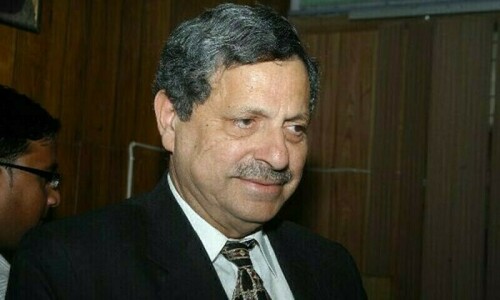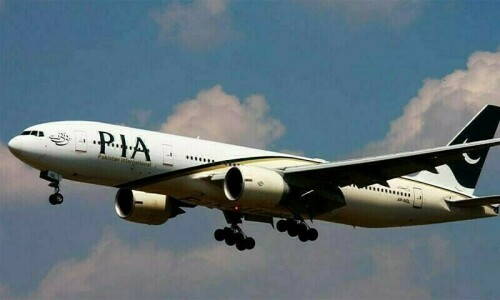KARACHI: Despite the success of the operation clean-up at Karachi airport which ended in elimination of all 10 militants, the smooth execution of the brazen attack clearly suggests the role of the Taliban’s sleeper cells in the city that must have planned it during the interval when their central leadership was busy talking peace with the government.
Background interviews with current and former intelligence and law enforcement officials revealed that real success against militants was not possible till the elimination of their sleeper cells whose members provided shelter, weapons, explosives, transport and even intelligence to their comrades responsible for carrying out attacks.
They said the attack on the airport was a work of planning that must have begun weeks if not months before its execution and it appeared the TTP leadership was using the time it had bought through a ceasefire to put the finishing touches to the planning of the airport attack.
“It’s not that simple that one fine day 10 men find a weak spot in the security and sneak into the airport, fire at security personnel and get killed after a pitched battle while trying to blow an aircraft,” said an intelligence official.
Also read: Uzbek fighters claim involvement in Karachi airport attack
“Even a common man can understand that there must be a mastermind [behind such attacks] but what they don’t understand is the fact that there are people, a lot of people in fact, who are living in their midst like normal people but actually work for terrorist groups,” he said.
Since its establishment, the officials said, the banned Tehreek-i-Taliban Pakistan, which claimed responsibility for the airport attack, has been sending its associates to Karachi with the single objective to blend with the local population and settle in their midst without arousing suspicion.
While hundreds, if not thousands, of TTP militants were already living and operating in the city with active support of their likeminded sectarian and jihadi groups, the TTP, during the time of Baitullah Mehsud, primarily used the sleeper cells to infiltrate private security firms in Karachi to collect information, which it used to rob banks, cash vans and moneychangers, said the officials.
Inside job
The officials said that it could not be ruled out that some Taliban loyalists managed to get some low-level jobs in sensitive places, where background checks were not at all carried out.
In depth: Karachi airport attack: How it happened...
“In several previous [terrorism] cases we have seen inside involvement,” said one former senior official. “A Rangers inspector gave information to militants about the route of then president Gen Pervez Musharraf when he visited Karachi in 2002. There are reports of inside help in the Mehran airbase attack. Some junior level army, navy and air force officials have been convicted of helping militants. So it’s not new...there must be some inside help [in the airport attack] also,” they said.
According to them, the inside help could come from airport workers, contractors, labourers working at the cargo shed, etc. There was also a possibility that someone in the Airport Security Force might have helped militants or their mastermind, they said.
“The ASF is an organised force and after the Mehran airbase attack every single security personnel posted at sensitive places like airports undergoes a lot of background checks. So no, I don’t think anyone in the forces could help them. Still, we are also looking into this aspect,” said an official.
However, the current and former officials concurred that without inside information such an attack could not be planned and executed.
Breakthrough not easy
With all 10 militants eliminated, it is hard to get a breakthrough in the investigation of the airport attack case.
“The central leadership of the TTP, or even the Al Qaeda, only chooses the target and gives the go-ahead [for the attacks]. But the work of planning, reconnaissance, selection of operatives, their travelling, boarding, etc. is overseen by a different man or a small group of men,” said a former official, who had investigated most high-profile terrorism cases since the 9-11 attacks in the US.
“Tracing that man or men is an uphill task, especially when all attackers have been killed and no one was captured alive,” he said.
The officials said that it might be possible the attackers did not communicate with each other through mobile phones. But it was not possible that they or at least one of them was not in contact with their or his mastermind over the phone.
“Finding that phone is the key. Or if the phone had been destroyed then a close examination of the call traffic from the cell towers concerned may lead to some breakthrough,” said a former official. “But this requires patience, lots of resources and manpower. I know this [process] has already begun and soon we will find the needle in the haystack.”
Two former officials said that investigation was the job of police and not the ASF. Unless they had CCTV footage, the ASF could not even find out what vehicle the terrorists used to reach the Fokker Gate.
The ASF is not trained to collect evidence. This was evident from their handling of the weapons recovered from the militants. There is always a possibility that someone other than the attackers may have left fingerprints on the weapons. The weapons should have been wrapped in plastic sheets before being sent for forensic examination. But this opportunity had been lost due to poor handling, they added.
Threat still alive
The officials warned that as long as the mastermind and the sleeper cells existed, people should be ready for more terrorist attacks as the militants were so indoctrinated that they were ready to die.
Related: TTP claims attack on Karachi ASF camp
Their sleeper cells would become active whenever the army launched a full-scale operation against their bases in Waziristan, the officials said, adding that the only way to counter them was an effective and coordinated intelligence collection mechanism and use of the latest technology. “We can win the war, but because of a lack of resources we are not winning it,” observed an official.
Published in Dawn, June 12th, 2014













































